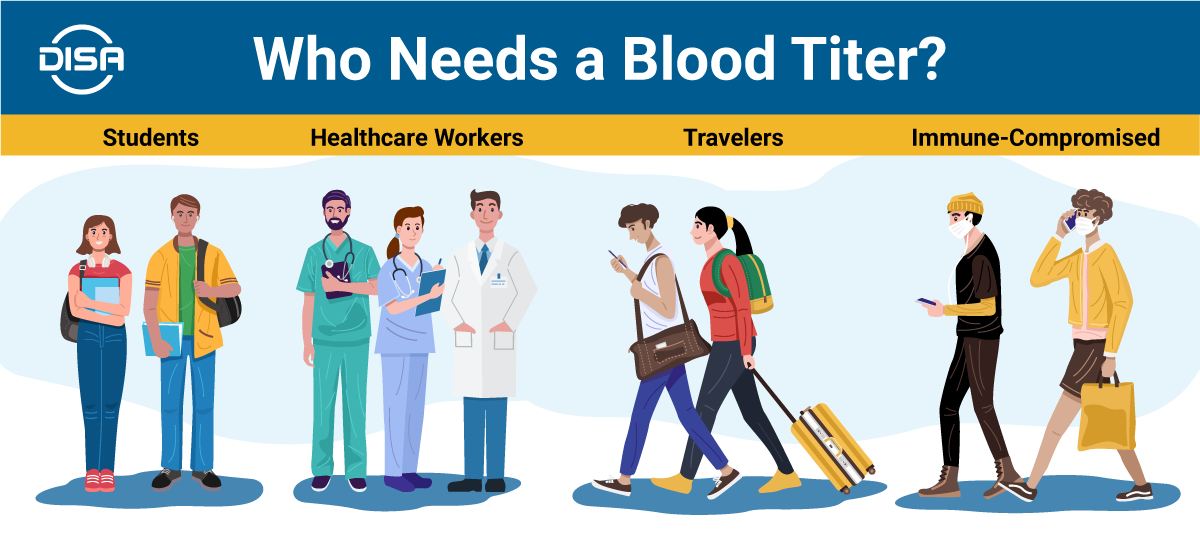Understanding blood titers and why they’re needed can be a challenge, especially for those new to the healthcare field or preparing for specific employment requirements. Blood titers are essential for proving immunity to certain diseases, a step often required in healthcare and other fields where exposure to infectious diseases is a risk. This guide will explain what blood titers are, who needs them, the process of getting one, and how to interpret the results.
What Is a Blood Titer?
A blood titer is a laboratory test that measures the concentration of specific antibodies in your blood. Antibodies are proteins produced by the immune system to fight off foreign invaders, such as viruses and bacteria. For healthcare settings, common blood titers include those for hepatitis B, measles, mumps, rubella (MMR), and varicella (chickenpox). By measuring antibody levels, a blood titer can determine whether you have immunity to a particular disease.
Why Antibody Levels Matter in Immunity Verification
The presence of specific antibodies indicates immunity to a disease. If your antibody levels meet a certain threshold, you are considered immune to that illness. This can be especially important for individuals working in environments where they may encounter infectious diseases, as it protects both them and the people they interact with.
Who Needs a Blood Titer?
Blood titers are often required for:
- Students in Healthcare Training Programs: Many medical, nursing, and allied health programs require students to prove immunity before starting clinical rotations.
- Healthcare Workers: Hospitals and healthcare facilities frequently require employees to provide proof of immunity as a preventive measure.
- Travelers and Individuals with Special Health Concerns: Doctors may recommend titers for those planning to travel abroad or individuals who need to verify immunity for personal health reasons.

Why Schools and Employers Require Blood Titers
In settings where infectious diseases are common, such as hospitals, having immunity to certain illnesses reduces the risk of transmission. Schools and employers often mandate blood titers to ensure a safe environment for patients and staff. The Centers for Disease Control and Prevention (CDC) also recommends that healthcare facilities implement vaccination and testing policies to protect against preventable infections.
How the Blood Titer Process Works: Step-by-Step Guide
The process of obtaining a blood titer can be broken down into a few steps:
Step 1: Getting a Lab Order
In the U.S., a licensed healthcare provider must order the blood test. This order specifies the type of titer required and where the results will be sent. Some companies and clinics include this lab order as part of their service, simplifying the process for patients.
Step 2: Making an Appointment for Blood Draw
You can schedule an appointment at your doctor’s office or a local lab to have your blood drawn. Many people opt to visit a Patient Service Center (PSC) operated by major laboratories if they don't have access to a regular healthcare provider. These centers are widely available in metropolitan areas, making it convenient to get blood work done close to home or work.
Step 3: Visiting the Lab
On the day of your appointment, arrive at the lab or PSC with your lab order. Some centers may require identification and insurance information. The blood draw itself is usually a quick process, often completed in under 15 minutes. Once drawn, your blood sample will be sent to a laboratory for analysis.
Does Health Insurance Cover Blood Titers? What to Know
While some insurance plans cover the cost of blood titers, it’s essential to verify this beforehand. Without the proper paperwork or a demonstration of “medical necessity,” insurance may not cover the cost, leaving the patient responsible for paying the bill. For those with high-deductible health plans, it may be more cost-effective to pay for the test upfront.
Understanding Blood Titer Results: Positive vs. Negative
Blood titer results generally fall into two categories: qualitative and quantitative.
- Qualitative Results: These results indicate immunity status in simple terms, such as “immune” or “not immune.”
- Quantitative Results: Quantitative results provide an actual numeric value, often accompanied by a reference range. This range helps individuals understand whether their antibody levels are sufficient for immunity.
Most labs deliver results within four business days, barring special circumstances. Once the report is available, it is sent to the ordering provider, who may release it directly to you or review it first.
What Do the Results Mean?
- Negative Result: A negative result means there is not enough antibody in the blood to confirm immunity. In such cases, a vaccination booster may be required.
- Positive Result: A positive result indicates immunity, meaning you have adequate antibody levels to protect against the disease.
Frequently Asked Questions About Blood Titers
How long does it take to receive blood titer results?
Most results are ready within four business days. However, certain tests may take longer, especially if they require specialized processing.
Do I need to fast before a blood titer test?
No, fasting is not required for a blood titer. You simply need to be well-hydrated to make the blood draw easier.
Where can I get a blood titer test done?
Many primary care providers can perform blood titer tests, or you can order one through a lab service provider and complete it at a local lab.
What if my insurance doesn’t cover the cost?
If your insurance does not cover blood titers, you may be responsible for the full cost of the test. Pre-paying can sometimes save money compared to billing insurance and later facing an uncovered expense.
How DISA Can Help
DISA Global Solutions offers a streamlined approach to obtaining blood titers, making it easier for individuals and employers alike. For organizations that require employee immunity verification, DISA provides efficient and reliable services, managing the entire testing process from scheduling to reporting. With nationwide access to certified laboratories and a commitment to fast turnaround times, DISA simplifies compliance with health and safety requirements.
As a leader in screening and compliance solutions, DISA supports healthcare employers, academic institutions, and other organizations with the tools needed to maintain safe environments. Our services are designed to meet the needs of various industries, providing peace of mind and helping people stay healthy in the workplace.
Related Articles
Prioritizing Mental Health at Work: Key Strategies
Workplace Hearing Testing: A Safety Guide
Enhancing Healthcare: The Role of Ergonomics for Safety & Efficiency
About DISA
Founded in 1986, DISA is the industry-leading provider of employee screening and compliance services. Headquartered in Houston, with more than 35 offices throughout North America and Europe, DISA’s comprehensive scope of services includes background screening, drug and alcohol testing, DOT & HR compliance, occupational health services, and I-9/ E-Verify. DISA assists employers in making informed staffing decisions while building a culture of safety in their workplace.


